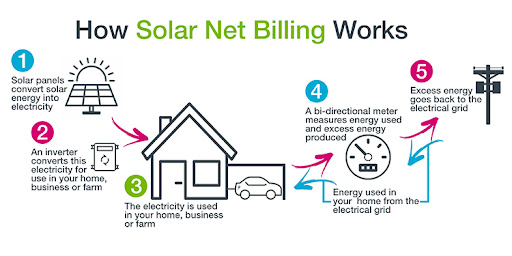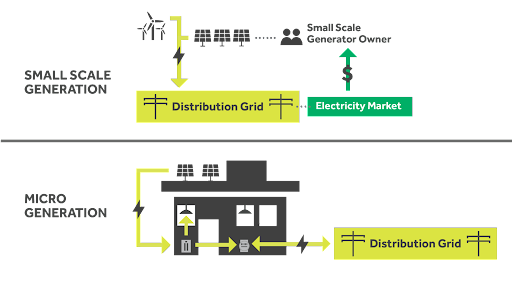Maximizing Solar Benefits: A Comprehensive Guide to Solar Net Metering in Alberta
With the ever-growing concern for environmental sustainability and the escalating costs of traditional energy sources, solar power has emerged as a compelling solution for both homeowners and businesses in Alberta. As the province embraces renewable energy, one of the most pivotal mechanisms to harness solar power is through net metering. Abiding by the fundamental mission at Solar Resource of educating Canadians about solar technology, this comprehensive guide, we will delve into the intricacies of solar net metering in Alberta, shedding light on how it operates under Alberta’s Micro-generation Regulation.
Understanding Solar Net Metering
What is Net Metering?
Net metering is a billing arrangement that allows solar energy system owners to receive credit for excess electricity generated by their solar panels. This surplus energy is fed back into the grid, effectively spinning the meter backward, and the system owner is compensated either through bill credits or monetary payments. This arrangement not only promotes the utilization of renewable energy sources but also provides an avenue for individuals to reduce their energy bills.

Alberta’s Micro-generation Regulation
Alberta’s Micro-generation Regulation, enacted in 2008, serves as the foundational framework for net metering in the province. The regulation empowers Albertans to generate their electricity from renewable sources, including solar panels, wind turbines, and hydroelectric systems, and connect them to the grid. This means that homeowners and businesses can become energy producers, reducing their carbon footprint and contributing to the overall sustainability of the province’s energy grid.
How Solar Net Metering Works
Installation of Solar Panels
The first step towards harnessing the benefits of solar net metering is the installation of solar panels on your property. These panels consist of photovoltaic cells that convert sunlight into electricity through the photovoltaic effect. The number and orientation of panels depend on factors such as available sunlight, roof size, and energy consumption.
Connecting to the Grid
Once the solar panels are installed, they are connected to your property’s electrical system and the provincial grid. Any excess energy generated by the panels is automatically sent to the grid, and your meter runs backward, accumulating credit.

Credit Accumulation and Usage
The surplus energy you generate is credited to your account. During times when your solar panels are not producing enough electricity (e.g., at night), you draw electricity from the grid as usual. The credits you earned during sunny periods offset the charges incurred when you’re using grid electricity.
Billing and Compensation
Typically, solar net metering involves a bi-directional meter that tracks both energy consumption from the grid and surplus energy fed back into it. At the end of each billing period, you are billed only for the net electricity used—your consumption minus the excess energy you generated. If your generation exceeds your consumption over a billing cycle, the surplus credits may roll over to subsequent months, helping you save on energy costs.
Benefits of Solar Net Metering
Financial Savings
One of the most compelling advantages of solar net metering is its potential for significant cost savings. By generating your electricity and offsetting your consumption with surplus energy, you can substantially reduce your energy bills. Over time, the upfront investment in solar panels can lead to substantial long-term savings.
Environmental Impact
Solar net metering contributes to a cleaner environment by decreasing reliance on fossil fuels and reducing greenhouse gas emissions. With each kilowatt-hour of solar energy generated, you are actively participating in the transition towards a more sustainable energy future.

Energy Independence
Solar net metering also grants you a degree of energy independence. By producing your electricity, you become less vulnerable to fluctuations in energy prices and supply disruptions. This can be particularly advantageous in the face of rising energy costs or unforeseen energy crises.
Return on Investment
While the initial investment in solar panel installation might seem substantial, it’s important to consider the long-term return on investment (ROI). As electricity prices rise and the technology becomes more efficient, your solar panels will continue to generate savings and potentially pay for themselves over time.
Eligibility and Considerations
Eligibility Criteria
To take advantage of solar net metering in Alberta, certain eligibility criteria must be met. These criteria may include:
- Being a customer of an approved electricity retailer.
- Owning or leasing a solar energy system that meets the micro-generation system capacity limit (typically up to 5 MW for residential systems).
- Ensuring the system conforms to safety and technical standards outlined by the Alberta Utilities Commission (AUC).

System Sizing and Consumption Patterns
When considering solar net metering, it’s essential to assess your energy consumption patterns and system sizing. An adequately sized system should be able to generate enough energy to offset a significant portion of your consumption without producing excessive surplus energy.
Regulatory Approvals and Paperwork
Engaging in solar net metering involves navigating regulatory processes and paperwork. This includes obtaining approvals from your electricity retailer and ensuring compliance with safety and technical standards outlined by the AUC. It’s advisable to work with certified solar installation professionals who are well-versed in the regulatory landscape.
Solar Net Metering and Solar Resource
Solar Resource: Empowering Your Solar Journey
Navigating the intricacies of solar net metering and Alberta’s Micro-generation Regulation can be overwhelming. This is where Solar Resource comes into play. As a trusted leader in the solar energy industry, Solar Resource is committed to guiding you through every step of your solar journey.
A Game Changer
In conclusion, solar net metering is a game-changer for Alberta’s energy landscape, enabling individuals and businesses to generate clean, renewable energy while enjoying substantial financial savings. With the support of Alberta’s Micro-generation Regulation, net metering empowers you to become an active participant in the transition towards a sustainable energy future. When considering solar net metering, partner up with Solar Resource to ensure a smooth and rewarding journey, marked by expertise, customization, and a commitment to your energy goals. Embrace solar net metering today and take the first step towards energy independence and a greener tomorrow.
Areas We Serve
- Calgary
- Edmonton
- Red Deer
- Lethbridge
- Airdrie
- St. Albert
- Grande Prairie
- Medicine Hat
- Spruce Grove
- Leduc
